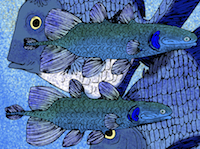Fishy beginnings (we are all bodies of water)

We are rather fishy, we humans. Right back to the first signs of life on earth at least 3.9 billion years ago, when small organic proteins likely interacted with their habitat to produce the first bacterial life forms, water has been necessary for the gestation of all living beings. Our earliest ancestors were all apparently water babies, squirming, scuttling or swimming around their respective watery worlds. Drawing on feminist theory, phenomenology, evolutionary biology, and some other queer tales of obstinate lungfish, nostalgic whales and aquatic apes, I am compelled to ask: how is my body an archive of these other watery bodies, anticipating aqueous paths not taken and remembering wet futures yet to come? These speculations are more than mere metaphor; they demonstrate the need for more audacious imaginaries in the context of our planet’s current growing water crises. Experiencing ourselves as bodies of water, deeply indebted to the watery milieus which bathed us all into being, is an ethical call from the deep.
 Astrida Neimanis joined the Gender and Cultural Studies Department at the University of Sydney in 2015 after holding various teaching and research positions at universities in Canada, the UK, and Sweden. She is Associate Editor of the journal Environmental Humanities (Duke University Press), a Key Researcher with the Sydney Environment Institute and co-‐convenor of the Composting: Feminisms and the Environmental Humanities reading group hosted at the University of Sydney. She is also a founding member and University of Sydney contact faculty for The Seed Box: A MISTRA-‐FORMAS Environmental Humanities Collaboratory (a transnational research consortium based at Linkoping University, Sweden). Her work connects feminist theory to water, weather, bodies, and other environmental matters. Bodies of Water: Posthuman Feminist Phenomenologies is forthcoming in 2016 (Bloomsbury).
Astrida Neimanis joined the Gender and Cultural Studies Department at the University of Sydney in 2015 after holding various teaching and research positions at universities in Canada, the UK, and Sweden. She is Associate Editor of the journal Environmental Humanities (Duke University Press), a Key Researcher with the Sydney Environment Institute and co-‐convenor of the Composting: Feminisms and the Environmental Humanities reading group hosted at the University of Sydney. She is also a founding member and University of Sydney contact faculty for The Seed Box: A MISTRA-‐FORMAS Environmental Humanities Collaboratory (a transnational research consortium based at Linkoping University, Sweden). Her work connects feminist theory to water, weather, bodies, and other environmental matters. Bodies of Water: Posthuman Feminist Phenomenologies is forthcoming in 2016 (Bloomsbury).
Margaret Jolly (FASSA) is an ARC Laureate Fellow and Professor in the School of Culture, History and Language in the College of Asia and the Pacific. She is an historical anthropologist who has written extensively on gender in the Pacific, on exploratory voyages and travel writing, missions and contemporary Christianity, maternity and sexuality, cinema and art. She chaired the Advisory Committee of ECOPAS, a European Union-‐funded consortium aiming to put the ‘human’ back into climate change in the Pacific. Her recent work includes research into deep time and the gendering of climate change in Oceania.
Please register for this public lecture online.
This public lecture is sponsored by the ANU Gender Institute as part of the workshop ‘Gender, Science and Wonder’.
Inquiries: Dr Rachel Morgain
CAP Department of Gender, Media and Cultural Studies
Dr Trang Ta tx.ta@anu.edu.au
CASS School of Archaeology and Anthropology






